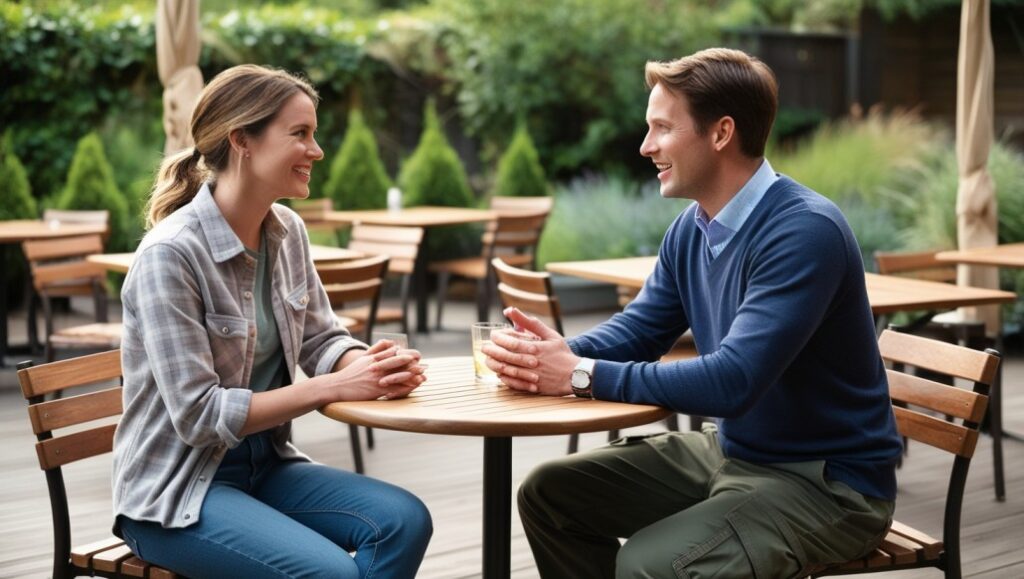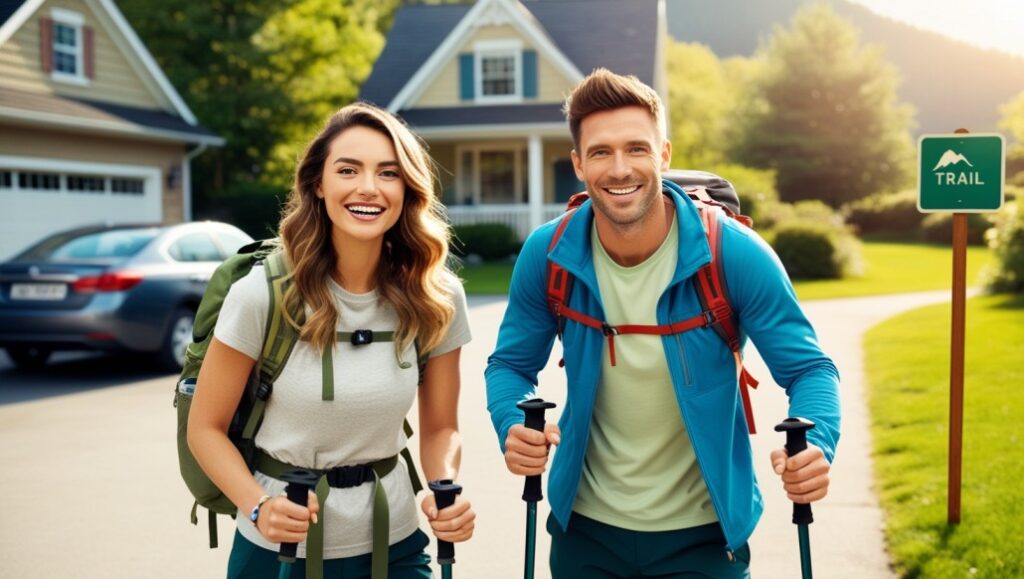Introduction
Improving your English doesn’t have to be boring—it can be exciting and practical! In this lesson, we’ll take you through five real-life conversations between friends planning their weekend adventures. Each dialogue includes with useful phrases, natural expressions, and tips to make your English sound more confident and fluent.
But this lesson isn’t just about planning trips—it’s about building your confidence to speak English in real-life situations. You’ll learn how to start conversations, share ideas, and make decisions effortlessly. At the same time, you’ll improve your fluency and sound more natural in every conversation.
By the end of this lesson, you’ll gain the skills to express yourself clearly, connect with others, and handle conversations like a pro.
- Introduction
- Why It's Important:
- Benefits of Learning About This Topic: (Planning a Weekend Trip)
- Here are 5 Real-Life English Conversations about this topic (Planning a Weekend Trip)
- Essential Key Phrases and How to Use Them
- Common Questions with Answers Related to this Topic: (Planning a Weekend Trip)
- Conclusion
Why It’s Important:
Planning a weekend trip is a practical and valuable topic for learning English because it covers everyday vocabulary, phrases, and skills that are useful in real life. Here’s why it’s important and why you should learn about it:
- Common Scenario: Planning trips is something people do often, whether it’s for fun, relaxation, or exploration. It’s a real-world skill that applies to everyone.
- Practical Vocabulary: Learners get to practice words related to travel, transportation, accommodations, activities, and weather.
- Improves Communication Skills: It teaches how to make suggestions, ask for opinions, and express preferences—essential skills for collaboration and teamwork.
- Boosts Confidence: Learners can use what they learn to plan their own trips, making them feel more confident when talking to native speakers or traveling abroad.
- Cultural Understanding: Discussing travel activities helps learners understand cultural norms, like popular destinations or activities in English-speaking countries.
Benefits of Learning About This Topic: (Planning a Weekend Trip)
- Real-Life Application: Being able to plan a trip in English can be useful when traveling or working with people from different cultures.
- Teamwork Practice: Trip planning usually involves discussions and compromises, which are great for practicing polite language and decision-making phrases.
- Fun and Engaging: Learning through a fun, relatable topic like weekend trips makes studying enjoyable and memorable.
Here are 5 Real-Life English Conversations about this topic (Planning a Weekend Trip)
Conversation 1: Planning a Beach Getaway
- Emma (Teacher)
- Mike (Software Engineer)

Conversation
Emma: Hey, Mike! How’s it going?
Mike: Hi, Emma! I’m good, just tired from work. What about you?
Emma: Same here. I feel like I really need a break.
Mike: I feel the same way. You know, we should plan a weekend trip. How about the beach?
Emma: That sounds perfect! I could use some sun and waves. Do you have a place in mind?
Mike: There’s this beach about two hours from here. It’s quiet, with clear water.
Emma: That sounds great. Should we drive there or take a bus?
Mike: I think driving would be more convenient. We can stop anywhere we want.
Emma: Good idea. How about leaving Saturday morning?
Mike: Works for me. What should we pack?
Emma: Definitely swimsuits, towels, sunscreen, and maybe a hat. Oh, and snacks for the drive.
Mike: Good call. Do you think we should book a hotel?
Emma: Yeah, just in case it gets crowded. I can check for affordable places tonight.
Mike: Perfect. And we can plan some activities too—maybe snorkeling or just relaxing by the water.
Emma: I’m all for relaxing. Let’s finalize the details tomorrow.
Mike: Let’s do it. I’m already excited!
Conversation 2: Planning a Camping Trip
- Sarah (Photographer)
- James (Doctor)

Conversation
Sarah: Hi, James! Long time no see!
James: Hey, Sarah! I know, it’s been ages. How’ve you been?
Sarah: Busy with work, but good. What about you?
James: Same here. I’ve been meaning to get out of the city for a while now.
Sarah: Me too. How about a camping trip this weekend?
James: Camping sounds awesome. Do you know any good spots?
Sarah: There’s a national park about an hour away. It’s supposed to be beautiful this time of year.
James: That sounds perfect. Should we bring our own tents?
Sarah: Yeah, and sleeping bags too. I’ll bring my camera for some nature shots.
James: Great idea. What about food?
Sarah: We can pack sandwiches and some easy-to-cook meals. Oh, and marshmallows for a campfire!
James: Can’t forget marshmallows. Do we need to get a permit for camping there?
Sarah: Yes, but it’s easy to get online. I’ll take care of it.
James: Thanks! Should we leave on Friday evening?
Sarah: That works. It’ll give us more time to explore.
James: Awesome. Let’s divide up the gear we’ll need.
Sarah: Good idea. I’ll list everything tonight and share it with you.
James: Sounds good. This is going to be fun!
Conversation 3: Planning a Road Trip to a Nearby City
- Olivia (Graphic Designer)
- Ben (Salesperson)

Conversation
Olivia: Hey, Ben! What’s up?
Ben: Hi, Olivia! Not much. Just the usual grind. How about you?
Olivia: Same. I need a change of scenery. Want to take a road trip this weekend?
Ben: That’s a great idea! Where should we go?
Olivia: How about that small town with all the antique shops and cafes?
Ben: I’ve heard it’s really charming. Let’s do it. How long is the drive?
Olivia: About three hours. We can leave on Saturday morning and spend the night there.
Ben: Perfect. Should we check out the local attractions?
Olivia: Definitely. I’ll look up some places we can visit.
Ben: And I’ll find a good place to stay. Do you prefer a hotel or a cozy inn?
Olivia: A cozy inn sounds nice. Let’s also plan where to eat. I’ve heard they have amazing bakeries.
Ben: I’m in. I’ll also check the car and make sure everything’s good for the trip.
Olivia: Good thinking. Don’t forget to bring a playlist for the drive.
Ben: Already on it. I’ll pick some road trip classics.
Olivia: This is going to be fun! Let’s finalize everything tomorrow.
Ben: Can’t wait!
Conversation 4: Planning a Hiking Adventure
- Chloe (Fitness Trainer)
- Ryan (Architect)

Conversation
Chloe: Hi, Ryan! Ready for the weekend?
Ryan: Hey, Chloe! Not really. I don’t have any plans yet.
Chloe: Perfect! Let’s go hiking. There’s a trail I’ve been wanting to check out.
Ryan: Hiking sounds great. Where is it?
Chloe: About an hour away. It’s supposed to have amazing views at the top.
Ryan: I’m in. What time should we start?
Chloe: Early, like 7 a.m., so it’s not too hot.
Ryan: Good idea. What should we bring?
Chloe: Water bottles, energy bars, comfortable shoes, and maybe a small first-aid kit.
Ryan: I’ll bring my hiking poles, just in case.
Chloe: Smart. Should we pack lunch, or eat after the hike?
Ryan: Let’s pack something light. We can grab a proper meal later.
Chloe: Sounds good. I’ll also check the weather to make sure it’s clear.
Ryan: Good call. Let’s meet at my place and carpool from there.
Chloe: Perfect. This is going to be a great workout and adventure!
Conversation 5: Planning a Museum Visit
- Lily (Writer)
- Jake (Engineer)

Conversation
Lily: Hey, Jake! Got any plans for the weekend?
Jake: Hi, Lily! Not yet. What’s up?
Lily: I was thinking about visiting the art museum downtown. Want to join?
Jake: That sounds interesting. I’ve been wanting to check out their new exhibit.
Lily: Me too. We could spend the morning there and grab lunch afterward.
Jake: Perfect plan. Should we book tickets online?
Lily: Yes, that’ll save us time. I can take care of it.
Jake: Thanks! Should we drive there or take public transport?
Lily: Public transport might be easier, and we won’t have to worry about parking.
Jake: True. What time should we meet?
Lily: How about 10 a.m. at the train station?
Jake: Works for me. Do we need to bring anything?
Lily: Maybe just a notebook, if you want to jot down ideas or sketches.
Jake: Good idea. I’ll bring my camera too, for inspiration.
Lily: Great! I’ll confirm the tickets and text you the details tonight.
Jake: Awesome. Looking forward to it!
Essential Key Phrases and How to Use Them
- Long time no see!
- Tips: Use this phrase when you haven’t seen someone in a while. It’s a friendly and casual way to greet them.
- Example: Long time no see! How have you been?
- I need a break.
- Tips: Use this when you feel tired or overwhelmed and need time to relax.
- Example: I’ve been working all week. I really need a break this weekend.
- That sounds like heaven!
- Tips: An exciting way to show that you love an idea. Use it when you really like someone’s suggestion.
- Example: A beach trip? That sounds like heaven!
- Let’s pack lunch.
- Tips: A simple way to suggest bringing food for a trip or outing. This is commonly used when planning to go somewhere like a park, hike, or beach.
- Example: We’re going to the beach, let’s pack lunch to save time.
- What time are we starting?
- Tips: A direct way to ask about the time of a plan or activity. Use it when you need to know when to meet or start something.
- Example: What time are we starting the road trip?
- Can’t wait!
- Tips: A common expression to show excitement about something. It’s great for showing how eager you are about an event or trip.
- Example: This weekend sounds amazing, I can’t wait!
- I’ll bring…
- Tips: A way to offer to bring something for a shared activity, like a trip or gathering.
- Example: I’ll bring snacks and drinks for the hike.
- Let’s split the cost.
- Tips: Use this phrase when you want to share the cost of something with someone. It’s often used in group settings.
- Example: We can split the cost of the camping site fee.
- Sounds great!
- Tips: A way to show agreement or approval. It’s a friendly way to say that you like the idea.
- Example: A road trip? Sounds great, I’m in!
- Let’s confirm the details.
- Tips: This is a good phrase to use when you want to make sure everyone is on the same page before making plans.
- Example: I’ll check the tickets and confirm the details by Friday night.
- Are you good with driving?
- Tips: A casual way to ask if someone is comfortable or okay with doing a particular task.
- Example: We need to carpool. Are you good with driving?
- What should I bring?
- Tips: A helpful phrase to use when you’re not sure what to pack or bring for a trip.
- Example: We’re going camping. What should I bring?
- Nature is your restroom.
- Tips: This is a humorous way to remind someone that there might not be modern facilities during outdoor trips.
- Example: Remember, it’s a camping trip—nature is your restroom!
- Let’s meet at 10.00 AM.
- Tips: A simple and clear way to suggest a meeting time. Use it when you want to set a specific time to meet.
- Example: Let’s meet at 8 a.m. on Saturday for the hike.
- Make sure to pack [item].
- Tips: A good way to remind someone to bring something important for the trip.
- Example: Make sure to pack sunscreen for the beach!
- I’ve got it covered.
- Tips: Use this when you want to assure someone that you’ve taken care of something.
- Example: Don’t worry about the tent. I’ve got it covered.
- I’m really looking forward to it!
- Tips: Use this to show you’re excited about a plan or event. It’s a more formal way to express excitement.
- Example: I’m really looking forward to our road trip this weekend!
- Let’s go over the checklist.
- Tips: Use this when you want to review all the important things before a trip to make sure nothing is forgotten.
- Example: Before we leave, let’s go over the checklist to make sure we have everything.
- I can’t wait to get out of here.
- Tips: A way to express your excitement about leaving work or a busy place for a more relaxing time.
- Example: I’ve been stuck at the desk all week. I can’t wait to get out of here for the weekend!
- I’ll check [details] and confirm.
- Tips: A way to let someone know that you’ll take care of confirming the important details.
- Example: I’ll check the weather forecast and confirm our plans tomorrow.
Common Questions with Answers Related to this Topic: (Planning a Weekend Trip)
Here are some common questions you’ll probably get asked when talking to someone about planning a weekend trip. If you master these questions and answers, you’ll be able to speak confidently and naturally when making plans or chatting with others about your trip. Knowing how to respond will not only help you sound more like a native speaker but will also make you feel prepared and excited for your trip. You’ll be able to handle any conversation about your weekend plans with ease and sound natural, no matter who you’re talking to!
- Question: What’s your favorite TV show?
- Example Answer: My favorite show is Friends. I can watch it over and over again.
- Question: What time should we meet?
- Example Answer: Let’s meet at 9 a.m. so we can start the day early and make the most of it!
- Question: How long will the trip take?
- Example Answer: It’ll take about two hours to get there, depending on traffic. We should be there by lunchtime.
- Question: Do I need to bring anything special?
- Example Answer: Just bring comfortable clothes and shoes, plus sunscreen if we’re going outdoors. I’ll bring snacks and drinks.
- Question: What’s the weather going to be like?
- Example Answer: The forecast says it’ll be sunny and warm, perfect for a day outside. Just in case, I’ll pack a light jacket.
- Question: How much should I budget for the trip?
- Example Answer: I’d say around $50 should cover food, gas, and any parking fees. We can split the costs if you want.
- Question: Are we driving together or separately?
- Example Answer: Let’s drive together! I think it’ll be more fun if we carpool and share the drive.
- Question: What are we doing once we get there?
- Example Answer: We can check out the local spots—maybe go to a museum, grab some food, and take a walk in the park.
- Question: Should we bring food or eat out?
- Example Answer: Let’s pack a lunch! That way, we can eat whenever we’re hungry, and it’ll save us time and money.
- Question: Do we need reservations for anything?
- Example Answer: No reservations are needed for the beach, but we should double-check for restaurants. I’ll make a reservation for lunch just to be safe.
- Question: Can we stop for a coffee on the way?
- Example Answer: Absolutely! We can grab a coffee at that café on the way. I know a great one near the highway.
- Question: What should we do if it rains?
- Example Answer: If it rains, we can check out indoor activities, like a museum or a local coffee shop to chill for a bit.
- Question: Will we be able to park easily?
- Example Answer: I’ve checked, and there should be plenty of parking at the beach, but it might be crowded in the afternoon. We’ll need to get there early.
- Question: Do we need to bring cash?
- Example Answer: It’s a good idea to bring some cash for small purchases, but most places accept cards.
- Question: How long will we stay there?
- Example Answer: I was thinking we could spend the day there, maybe leave around 5 or 6 p.m. so we’re not driving too late.
- Question: Are we hiking or just relaxing?
- Example Answer: It depends on how we feel! We can do a short hike in the morning, then relax on the beach afterward.
- Question: Is there anything we should be careful of?
- Example Answer: Just make sure to stay hydrated and wear sunscreen. It’s easy to forget, but we’ll be outside a lot.
- Question: Should we invite anyone else?
- Example Answer: Sure! The more, the merrier. I think it would be fun to have a small group.
- Question: What happens if we get lost on the way?
- Example Answer: Don’t worry—I have GPS. If we get lost, we’ll just follow it and be fine. It’s hard to miss the beach!
- Question: Are there any fun things to do at night?
- Example Answer: Yeah! If we’re staying overnight, we could have a bonfire at the beach or check out a local restaurant for dinner.
- Question: What should we wear?
- Example Answer: Wear something comfortable. I’m thinking casual clothes for the day—maybe something you can easily move around in.
- Question: Are we camping or staying in a hotel?
- Example Answer: I was planning for a day trip, but if we decide to stay overnight, we can camp or check out a nearby hotel.
- Question: Will there be Wi-Fi where we’re going?
- Example Answer: Most likely not, but that’s part of the fun, right? We can take a break from the internet and enjoy the outdoors!
Conclusion
Planning a trip is a fantastic way to practice everyday English while preparing for something fun and exciting. Whether it’s a quick road trip, a hike through nature, or a day at the museum, these conversations show how easy and enjoyable it can be to communicate your ideas and make decisions with friends.
By learning phrases like “What do you think about this idea?” or “Should we book ahead?” you can confidently discuss options, organize your plans, and even suggest your own ideas. The more you use these phrases in real-life situations, the more natural your conversations will feel.
Trips are not just about getting to a destination—they’re about sharing moments, working together, and making memories. So, the next time you plan something, take the lead, speak up, and enjoy the process of both planning and learning. You’ve got this!
What’s your dream weekend trip? Share it with us and let’s start a conversation! 🌟


